In the Still of the Night Read online
Page 11
Ron was terribly concerned about money--seemingly far more than he was about Ronda's death. Barb bit her tongue to keep from saying that out loud. Was it possible that Ron was still in shock over her daughter's dying so suddenly? That would be a lot easier for Barb to accept. How could he be so cold and so ready to throw Ronda away? Ronda had loved him, and been optimistic about her new marriage. There must have been something there eleven months ago.
"May I have her car?" Barb Thompson thought she might be able to find some evidence--something--in Ronda's Suzuki Tracker that could help to explain what had happened.
"No," he said quickly. "I need to keep that. My name is on it."
"I flew here, Ron," she thought rapidly, trying to find a reason to convince him. "I don't have a car. I thought if I borrowed her car, I could take the dogs."
"Well, then--I guess you could. I'll get my boys to unload it."
Barb didn't want that. If the Reynolds boys cleaned out the car, removing Ronda's things, they might either accidentally or deliberately remove evidence, too. Maybe the sheriff's office could get a search warrant and execute it before that happened. She told Ron it might be better if they waited until she found a place where she could board the dogs first.
"May I have her china cabinet? Her grandmother gave her that." Surely he wouldn't be so greedy that he would keep that.
But Ron did refuse once again. "I have to keep that. Ronda and I bought that new dining room table to match it."
She didn't know how long she'd been in Ronda's house, but she did know that Ron Reynolds had never looked into her eyes. She told his averted face that she would be in Toledo for a few more days, and that he could always call her home phone and leave a message.
"I'll check on funeral arrangements and let you know," she said.
Barb turned toward Katie and gave her what she knew was a contrived smile. Katie didn't seem to notice that. Maybe Katie was sincere--but brainwashed.
Barb walked to Dave's truck and got in. She was curious about Katie's "poem," and she smoothed the wrinkled paper out while Dave looked on.
It was dedicated to Ronda, and titled "Tragic Sadness." In it, Katie painted herself as someone who had always helped Ronda.
She ended:
Now I mourn her tragic death with many sad tears.
A troubled frantic girl
Yet filled with love and grace,
Her fine qualities
Would fill a large space.
I loved her as a sister
And I mourn that she is gone
I will put this good-bye
To a piano song . . .
Rest, dear Ronda--I will miss you.
Barb wondered how Katie had the audacity to hand her the syrupy poem, professing how much she missed Ronda, after she had slept with Ron in Ronda's own bed the night after she died.
"He didn't say he had loved Ronda," she told Dave Bell. "He didn't say he was sorry she is dead."
AT ONE THAT AFTERNOON, Dave Bell and Barb Thompson went back to Jerry Berry's office. Still stunned by the odd reception she had received at Ronda's home, Barb read aloud the notes she had written down immediately after leaving. She described Ronda's widower as being not only unconcerned about her death, but derisive and insulting. He seemed interested only in his financial situation. He had made the insurance payment after Ronda was dead, and her son-in-law (if that was what he still was) said he had hired an attorney. He wanted to be sure he got Ronda's share of the proceeds from the McCleary house she owned with her former husband, Mark Liburdi. Berry made a note to check on that.
The Lewis County detective wasn't surprised to hear about Ron's attitude; he had noted the new widower's remarkably flat emotional affect the day before. He wasn't resistant to their investigation, and Reynolds had even let Berry come back to the house on Twin Peaks Drive so he could measure all angles of the closet where Ronda died. But he sure didn't act as though he was in mourning.
"How long did Ronda know that Ron wanted to end their marriage?" Berry asked her mother.
"It wasn't a surprise--not on the day she died," Barb said tentatively. "When I talked to her on Sunday--December thirteenth--she told me Ron was definitely going back to Katie. And she said she'd known that for several days, but I'd known her marriage was in trouble for months. I urged her to check and be sure he was paying her bills with the paychecks she gave him."
Jerry Berry wanted to talk further with Barb, but he had an urgent appointment. He didn't tell her what it was because he was headed for the postmortem exam of Ronda's body, and he didn't want to remind her of that image.
That afternoon--Thursday, December 17--forensic pathologist Dr. Dan Selove stood ready to perform the autopsy on Ronda Reynold's body. He'd been called in from Snohomish County, which was north of Seattle and more than a hundred miles from Lewis County. He was a "traveling pathologist," often hired by smaller counties in Washington who needed an expert opinion. There was no one on the coroner's staff who could do it; Coroner Terry Wilson was not an M.D.--he was a physician's assistant.
Wilson did not attend Ronda Reynold's postmortem exam.
With Deputy Coroner Carmen Brunton and Lewis County detectives Sergeant Glade Austin and Jerry Berry observing, Dr. Selove looked at Ronda as she rested on the autopsy table. She was slightly shorter than five feet, seven inches tall, and he estimated her weight as being between 135 and 145 pounds. She was a lovely woman, the blood washed away from her ear and check, and from her hair, which he could now see was blond with brown roots. She wore purple bikini panties under her matching pajama top and bottom, and the top was stiffened where it was drenched in dried blood.
This was obviously a woman who had taken good care of herself; her hair was professionally cut, and her false nails were perfect--all but the middle fingernail on her left hand, which had a ragged tear along the tip. Had the bullet that killed her ripped her nail, too? Or had she struggled with someone as she fought for her life? There were few signs that she might have been involved in a physical struggle; beyond the torn nail, she had two pinkish, purple bruises on the knee and shin of her left leg. They might well have occurred hours before she died.
The forensic pathologist looked at the single bullet wound near Ronda's Reynolds's right ear. He quickly determined that it was an entrance wound that had no stippling of gunpowder fragments or soot on the skin. That was because all of the gunpowder was inside the wound track. This was a contact wound.
Either Ronda--or someone else--had placed the weapon tight against her skin. The resultant path of the slug was, according to Dr. Selove, from front to back, right to left, with a slight vertical downward angle. It had not crossed the midline of the brain.
The postmortem showed that, ironically, Ronda had been in excellent physical shape before the handgun's slug ripped through the right portion of her brain, ending in the back of the left side of her skull.
It was Dr. Selove's opinion that she had clinically died instantly as the bullet severed her spinal cord. He felt that she would have been unable to move any of her limbs.
Ronda's heart, lungs, liver, kidneys, urinary tract, and reproductive systems were all normal. Still, she had had a number of miscarriages, the biggest sorrow of her life. No doctor had ever been able to isolate the cause. Nor could Dr. Selove detect any blatant malformation or condition that might have prevented her from carrying a pregnancy to term.
Jerry Berry asked Dr. Selove to take oral, rectal, and vaginal swabs. He nodded, and asked his assistant to clip her fingernails, too. Somewhat surprisingly, the vaginal swab revealed a moderate number of active sperm, with attached tails. Ronda had had intercourse--or, perhaps, been raped--within hours before or after her death. That might explain the bruises on her leg. Since DNA matching was far from perfected in 1998, they could probably not match the semen to one particular man, although they could determine blood type if he had been a "secretor."
Rigor was already well established. There was no question about the cause of h
er death. There were myriad puzzles about "why," "when," and "by whose hand."
When the paper bags were removed from Ronda's hands, they observed hairlike fibers in her left hand, and a single identical fiber caught in her broken nail. Had she put up her hand in a vain attempt to fend off a bullet? If she was asleep--with her left hand beneath her head--the shattered nail couldn't have been hit by a slug; the path of the wound had not gone through her entire head.
The hair or blanket fibers caught in the nail might prove to be vital physical evidence, or they might mean nothing. Glade Austin and Berry did their best to preserve everything that might be useful to the case.
The two detectives carefully sealed and labeled everything that could be proved to be evidence of suicide--or of a manner of death that was anything but suicide.
Since Ronda's widower had told Barb Thompson that he didn't care what she did with her body, Barb made the arrangements to have Ronda cremated.
BARB THOMPSON CALLED HER MOTHER, although it was so hard to talk to her, knowing the grief that consumed her and not being able to give her any comforting news. Next she called Skeeter. She could tell by his voice that he was in a lot of physical pain. He had already done all the chores around the ranch without waiting for her son, Freeman, and he admitted his prescribed pain medication wasn't working.
Skeeter was not the love of Barb's life, but he was so considerate and he'd brought much-needed love and companionship to her. Without hesitation, without a second thought, he was there for her. He fought his own inner battles, struggling with the tragedy of his wife's death, alcohol, and his deteriorating health. But he was a stable haven where she could retreat, giving her strength to keep going.
Barb met Skeeter through her good friend Sandy. Sometime in the late 1980s, a woman and a small girl knocked on Barb's door. Sandy had an eighteen-year-old son who had suffered a devastating traumatic brain injury in an accident. He was left completely disabled, and his mom, Sandy, took full care of him and his little sister, Pauline. Later she would help care for Barb's mom, Virginia.
Like so many people who appeared at Barb's door, Sandy needed help with a horse. She had loaned Pauline's pony to a woman, and they needed someone to help them retrieve it. As always, Barb said, "Of course."
In 1991, Skeeter and his wife were in a violent car crash; an oncoming car had swerved into their lane and hit them head-on. Skeeter's wife was killed instantly, and he was taken by helicopter to Deaconess Hospital in Spokane in critical condition. He had a broken back and was in a coma for so long that he missed his wife's funeral.
Skeeter came out of his coma, although his broken back never healed completely and left him in constant pain.
"I didn't know him then," Barb recalled. "He was a mechanic, and he turned out to be the best mechanic I'd ever been around--he was a genius."
In 1992, Sandy and Skeeter were neighbors--and Sandy became very attached to his small daughter, Cheri-Lynn. She often brought Cheri-Lynn to Barb's ranch because the child loved horses, and Barb let her ride her Palomino stallion, Spokane Gold.
Barb sold a horse a year later and used the money to buy a new one-ton pickup truck. Three years later, her transmission froze and Sandy suggested she take it to Skeeter to get it fixed.
"You need to meet Skeeter anyway," Sandy urged. "He's single, loves horses, and he's a great mechanic."
Barb and her longtime friend, Don Hennings, had agreed to go their separate ways three years before. Although they were in love, they so often had problems getting their lives to mesh.
Despite the failure of their relationship, Don remained the father figure in Barb's family. He proudly shouldered the responsibility of being Barb's children's father. It worked for them.
"Don walked Ronda down the aisle for her wedding to Mark, and he went over to McCleary every six or eight weeks to work on Ronda's horse's feet and take her some hay. It was just that our romantic relationship seemed to die of its own weight in 1993."
Barb had been lonely, and so had Skeeter. She made an appointment to take her truck to his shop, and "the rest was history. We clicked immediately and the romance began. I already knew his daughter, Cheri-Lynn, and everything fell into place. She and Skeeter moved in with me."
BUT THEN RONDA was killed two years after Skeeter moved in with Barb, and Barb could think of nothing else. Fortunately, Cheri-Lynn was grown and on her own.
"Skeeter unselfishly put his own grief aside to nurture me through mine," she recalled.
When she called him from Toledo, Skeeter assured Barb that Daisy was okay at the boarding kennel and that he would visit the pup Ronda had given her the next day. She knew he would find time for Daisy. He loved the dog almost as much as Barb did, and knew how important it was that Daisy didn't feel she'd been abandoned.
"We said our 'I love you's' and 'goodbyes,' and I lay down to try to sleep in the motel. But sleep evaded me. Instead, I was haunted by thoughts and images of Ronda and different scenarios of what could possibly have happened at 114 Twin Peaks Drive."
Three days later, Barb was back in Chehalis. She and David Bell planned to meet with Detective Jerry Berry for dinner, and, hopefully, put together a plan. She knew she would have to talk to Ron Reynolds again, and that she would still have to continue her act to make it seem as if she didn't suspect him in Ronda's death.
Barb wanted to be sure that Jerry Berry knew that Jonathan Reynolds had threatened her daughter's life, about Ron's infidelity and his ongoing affair with Katie Huttula Reynolds, and that Ronda had mentioned her HIV fears on the evening of December 15 in their last phone call. Knowing of Katie's predilection for drugs, Ronda had been fearful that she might have contracted AIDS.
"I wanted to tell Detective Berry about Ronda's final realization of the kind of man Ron Reynolds really was, and let him know that my daughter put fifteen thousand dollars of her own money down on their house in Toledo. That she worked day and night--every spare minute she could find--to clean, paint, and remodel the home she shared with Ron. Maybe, taken individually, these things didn't mean so much, but together they formed a pattern of an evil, manipulative, money-hungry man."
Barb dreaded seeing Ron again, but she knew she had to. She vowed that she wouldn't let him make her cry--no matter what he said about Ronda.
"I wanted to see if he would tell me anything that would help me understand what happened that night. I had to make funeral arrangements, and I needed to be sure Ronda's dogs were okay."
Barb wasn't surprised to see Katie's car when she pulled into the driveway of what had been Ronda's home less than a week before. There was still frost on the windshield, indicating that it had been there all night.
"That didn't surprise me, either," she said. "I wondered how either one of them could sleep in Ronda's bedroom--in her bed--just twelve feet away from where she died, much less sleep together. It sickened me, especially remembering Katie's 'poem.' I forced my mind to turn to other things."
Barb heard the dogs bark, and walked to the side of the garage to look at them. They looked cold, but they had food and water, and it appeared that Ron had been leaving the heat lamp on in their doghouses.
"They also seemed sad and lonely, and I whispered my promise to them that it wouldn't be long before I got them out of there."
Ron's attitude toward Barb was surprisingly much warmer than it had been the previous Thursday. He assured her that he was having Katie and his sons box up some of Ronda's things for her, but he still couldn't let her have any of Ronda's jewelry.
"I'm afraid that might incriminate me, and make it look as if I had a motive to kill her," he said inexplicably.
She stared back at him. Why on earth would he think that?
"Ronda bought and collected a lot of fine jewelry," Ron said.
Barb knew that. Her daughter had treasured sentimental gifts of jewelry and saved up for other pieces. Did her widower think he could hide their value? (Later, she learned he had declared the value of Ronda's jewelry at a vastly underpri
ced $1,000.)
"I took a lie detector test," he told her, "and I didn't pass it. Jerry Berry told me that wasn't unusual under the circumstances, but my attorney told me not to talk to anyone. Do you know who's accusing me?"
Barb thought quickly. She suggested it might have been Ronda's paternal grandmother, Lavada, who lived in Oklahoma. Ron would have no idea how to contact Lavada, and it would seem--for a time--that Barb believed everything he was saying.
He repeated what he had told the detectives--that Ronda was alive at 5 A.M. on December 16, that he had talked to her and asked if she was okay.
"I kept her right beside me all night long, talking to her all the time to keep her awake--until she was so tired she would just fall asleep and not be able to hurt herself."
Barb could tell by his body language that he believed he had total control of the situation, and that he had convinced her of his innocence and even his power over her.
"I let him believe that," she said. "It would be better that way. If he thought I believed him, the more apt he'd be to make a mistake. Maybe his self-confidence was his worst enemy.
"No," she said emphatically as she recalled her second visit to Ron after her daughter's death. "I was his worst enemy. He just wasn't clever enough to know that."
He repeated a list of items he could not let her have because his attorney had told him to hang on to everything. Even Ronda's car. He said he couldn't help with any funeral arrangements because he was "too busy." He did offer to pay at least part of Ronda's funeral expenses, as he felt "somewhat responsible."
Barb bit the inside of her cheeks until she tasted blood to keep herself from striking back at him.
"He wanted me to take the dogs because they were almost out of food, and he didn't want to buy any. It was so hard to stand my ground and say I couldn't take them yet--when my heart was crying over leaving them. I knew if I took them, I would have no leverage to try to gain anything else personal that had belonged to Ronda."
She fought back the primal instinct that gripped her; she wanted nothing so much as to tear this man apart, limb by limb. She believed he had killed her child, and she wanted to see his eyes filled with fear. Still, she forced her features into a semblance of serenity so he wouldn't know.

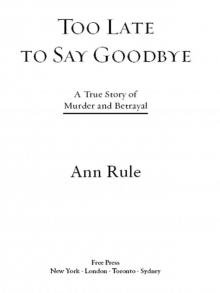 Too Late to Say Goodbye: A True Story of Murder and Betrayal
Too Late to Say Goodbye: A True Story of Murder and Betrayal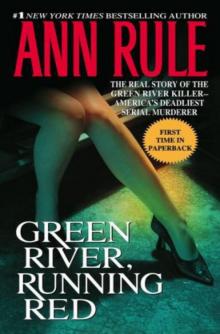 Green River, Running Red
Green River, Running Red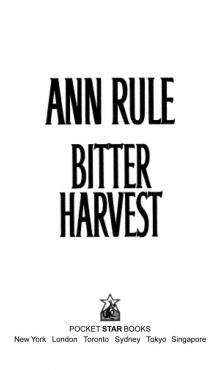 Bitter Harvest
Bitter Harvest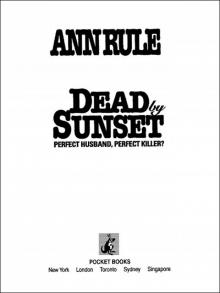 Dead by Sunset: Perfect Husband, Perfect Killer?
Dead by Sunset: Perfect Husband, Perfect Killer?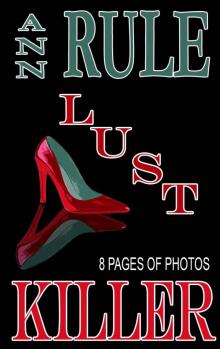 Lust Killer
Lust Killer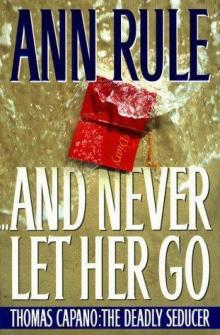 And Never Let Her Go: Thomas Capano: The Deadly Seducer
And Never Let Her Go: Thomas Capano: The Deadly Seducer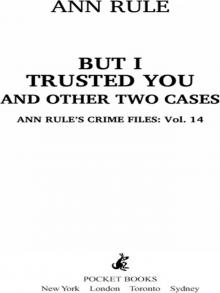 But I Trusted You and Other True Cases
But I Trusted You and Other True Cases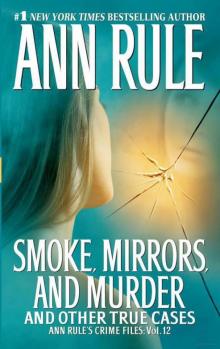 Smoke, Mirrors, and Murder and Other True Cases
Smoke, Mirrors, and Murder and Other True Cases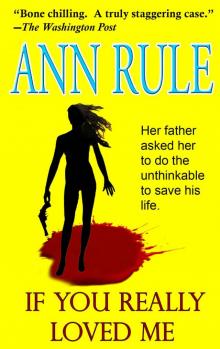 If You Really Loved Me
If You Really Loved Me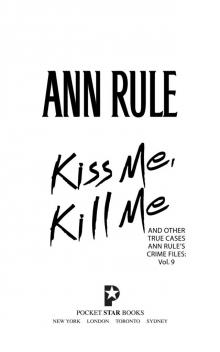 Kiss Me, Kill Me and Other True Cases
Kiss Me, Kill Me and Other True Cases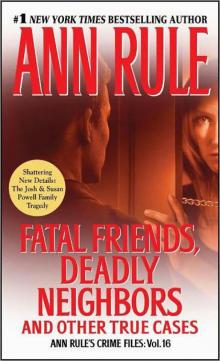 Fatal Friends, Deadly Neighbors and Other True Cases
Fatal Friends, Deadly Neighbors and Other True Cases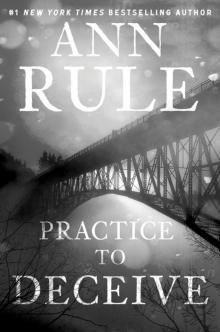 Practice to Deceive
Practice to Deceive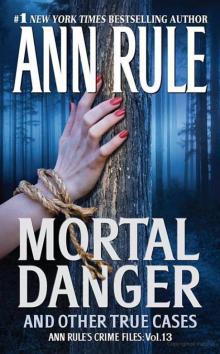 Mortal Danger and Other True Cases
Mortal Danger and Other True Cases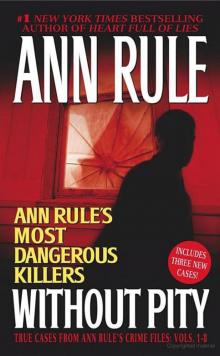 Without Pity: Ann Rule's Most Dangerous Killers
Without Pity: Ann Rule's Most Dangerous Killers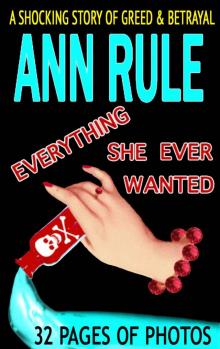 Everything She Ever Wanted
Everything She Ever Wanted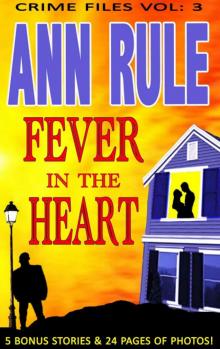 A Fever in the Heart and Other True Cases
A Fever in the Heart and Other True Cases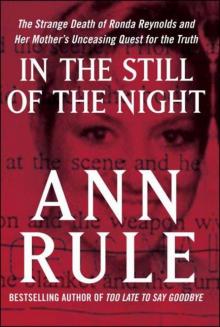 In the Still of the Night
In the Still of the Night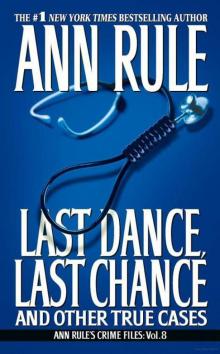 LAST DANCE, LAST CHANCE - and Other True Cases
LAST DANCE, LAST CHANCE - and Other True Cases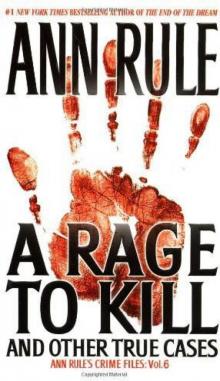 A Rage to Kill
A Rage to Kill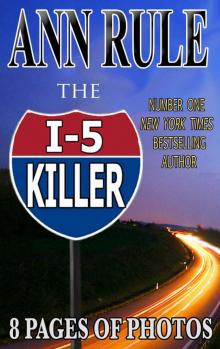 The I-5 Killer
The I-5 Killer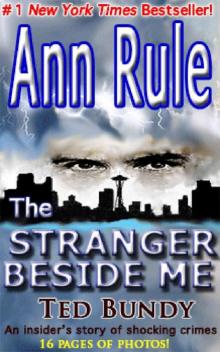 The Stranger Beside Me
The Stranger Beside Me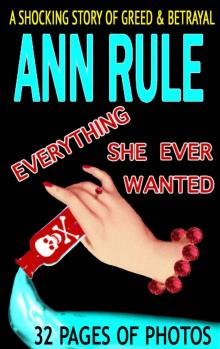 Everything She Ever Wanted: A True Story of Obsessive Love, Murder, and Betrayal
Everything She Ever Wanted: A True Story of Obsessive Love, Murder, and Betrayal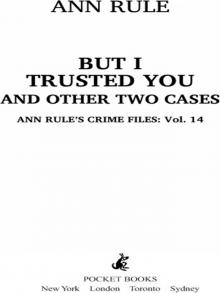 But I Trusted You
But I Trusted You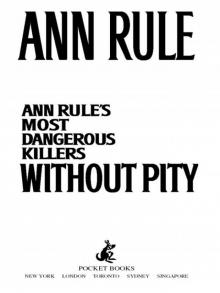 Without Pity
Without Pity Kiss Me, Kill Me
Kiss Me, Kill Me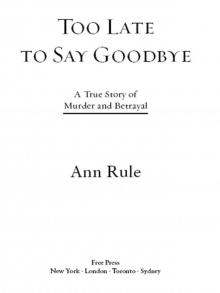 Too Late to Say Goodbye
Too Late to Say Goodbye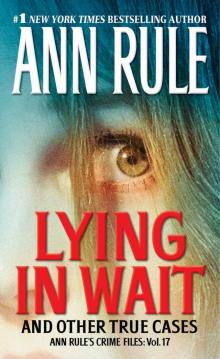 Lying in Wait
Lying in Wait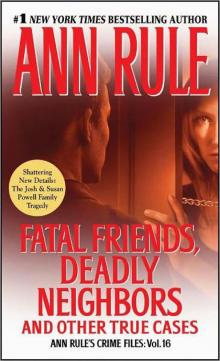 Fatal Friends, Deadly Neighbors
Fatal Friends, Deadly Neighbors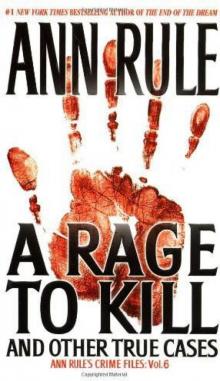 A Rage to Kill: And Other True Cases
A Rage to Kill: And Other True Cases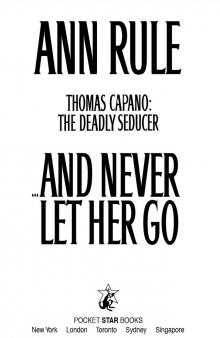 And Never Let Her Go
And Never Let Her Go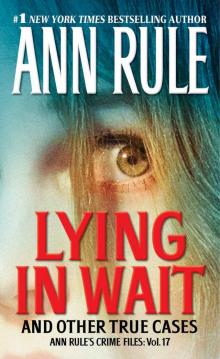 Lying in Wait Ann Rule's Crime Files Vol.17
Lying in Wait Ann Rule's Crime Files Vol.17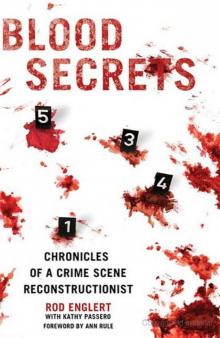 Blood Secrets: Chronicles of a Crime Scene Reconstructionist
Blood Secrets: Chronicles of a Crime Scene Reconstructionist No Regrets
No Regrets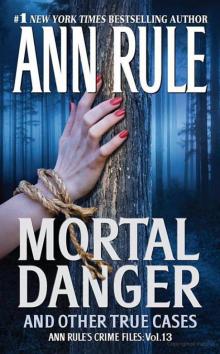 Mortal Danger
Mortal Danger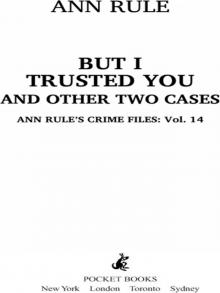 But I Trusted You: Ann Rule's Crime Files #14
But I Trusted You: Ann Rule's Crime Files #14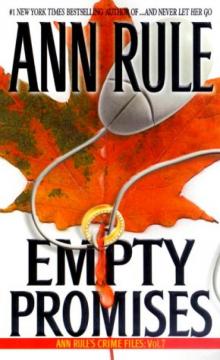 Empty Promises
Empty Promises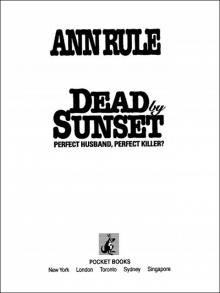 Dead by Sunset
Dead by Sunset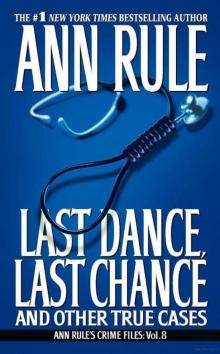 Last Dance, Last Chance
Last Dance, Last Chance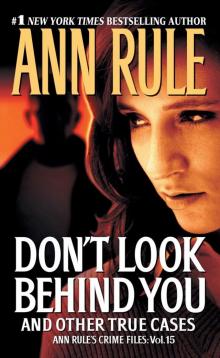 Don't Look Behind You
Don't Look Behind You